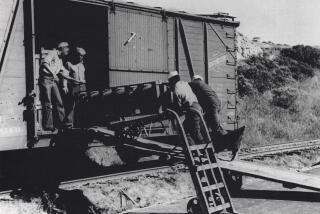1 Probe Cleared Skipper Who Let Refugees Drift
- Share via
The captain of the U. S. warship under investigation for failing to rescue a boatload of Vietnamese refugees last June was initially cleared of any wrongdoing by a Navy official in the Middle East who conducted an inquiry, a Navy source said Thursday.
Despite the finding that Capt. Alexander G. Balian had acted properly when he spotted the refugees in the South China Sea, gave them food and sailed on, Navy officials in San Diego have accused Balian of violating regulations in the incident and have begun a second investigation that could lead to a court-martial.
Balian, 48, of Los Angeles, was skipper of the Dubuque, an amphibious landing ship, when it encountered a boat carrying more than 100 refugees in the South China Sea on June 9. The refugee boat remained at sea for 19 days after the Dubuque passed it by. Some of the survivors reportedly have said they resorted to cannibalism to survive.
Earlier Finding Questioned
The new investigation is being conducted by officials of the Pacific Fleet’s surface ship force, which has its headquarters in San Diego. The officials apparently rejected the findings of the investigation conducted by Capt. H. J. Miller, commander of the Middle East force mine countermeasures group, who determined July 21 that “everything was in order,” the source said.
Earlier this week, Navy officials in San Diego brought administrative charges against Balian, accusing him of failing to follow orders and Navy procedures that required him to provide adequate assistance to refugees.
When Balian exercised his right to forgo the administrative procedure, the officials said they would consider a range of judicial actions, including an investigation that could lead to a formal court-martial.
Balian’s lawyer, Lt. Cmdr. Ron Petronio, said Thursday that Balian turned down the administrative procedure, called an admiral’s mast, in part because it is a secret proceeding. “He wants his story told,” Petronio said.
Petronio said Balian twice before rescued refugees and believes he did nothing improper June 9.
Navy policy is to provide humanitarian assistance whenever possible, but it is up to a ship’s commanding officer to judge whether a refugee boat is in danger of sinking and if the people aboard need to be picked up.
The refugees reportedly set off in a 35-foot wooden boat from a town in the Mekong Delta May 22, but the boat’s engine failed two or three days later.
Only 52 of the refugees survived the trip, which ended June 28, when they were rescued by Philippine fishermen.
Some of the survivors were quoted in the Philippine press as saying they killed and ate some of their fellow passengers to stay alive in the three weeks after they encountered the Dubuque.
More to Read
Sign up for Essential California
The most important California stories and recommendations in your inbox every morning.
You may occasionally receive promotional content from the Los Angeles Times.










